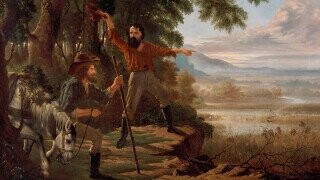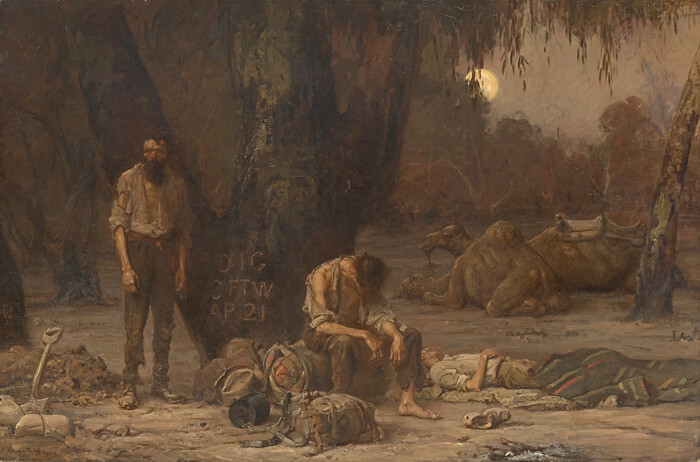History's Dumbest Explorers: The Burke And Wills Expedition

History is filled with bad explorers, adventurers who were completely misguided in their “discoveries” and demonstrated almost impressive levels of incompetencies. Among the dumbest are Burke and Wills, who had no business trekking the Australian Outback, but boy did they try. And die.
In 1851, Victoria experienced a gold rush, which brought a massive increase in population. Between 1851 and 1861, the population of Victoria jumped from 29,000 to 139,916.
With this large population, the Royal Victorian Society organized an expedition to go from the southern tip of Australia to the Gulf of Carpentaria in the north. They turned to two men to lead this adventure: Robert O’Hara Burke and William John Wills. Now, Wills was a surveyor, but Burke was not an explorer by trade. He was a soldier and police officer from Ireland. His qualifications for embarking on a major continental expedition were beyond lacking.
Along with Burke and Wills was an all-star cast of 18 other people, 23 horses, 26 camels, and (no joke) 20 metric tons of supplies, equipment, and nonsense. Nonsense includes a Chinese gong and a luxury writing desk.

Edward Jukes Greig
Burke, Wills, and their parade of idiocy took off from Melbourne on August 20, 1860. Their first destination was Menindee, an outpost more than 450 miles away. It took them two months to get this far, only a fraction to their final destination, and the expedition was already full of dysfunction. Several men quit during this first stage of the trek, and some unnecessary provisions were dropped.
Nevertheless, the expedition moved forward to Cooper’s Creek. Burke and Wills established a depot, and it was at this depot that a horrible decision was made. To hopefully make the remaining part of the journey to the north quicker, Burke and Wills decided to finish the trek with only two other men, Charlie Gray and John King. The rest of the party would remain at Cooper’s Creek. If Burke and Wills did not return in four months, those at Cooper’s Creek were instructed to leave.
With their smaller party of humans and a few animals, Burke and Wills actually did make it to their intended destination of the Gulf of Carpentaria. However, in true Burke and Wills fashion, even success came with failure. The dense mangroves of the area prevented them from reaching the shores. But they basically succeeded.
This would be the last time anything went right, though. Excessive supplies were used during the trip to this gulf, and this meant that the party did not have enough for the return journey. Starvation and disease hit the party, and Charlie Gray died. The remaining three party members did arrive back at Cooper’s Creek, though, on April 21, 1861. They arrived to discover that those who stayed behind at the depot had already left. Burke and Wills missed them by nine hours.

John Longstaff
Four months had passed since Burke and Wills left Cooper’s Creek, and as they were instructed to do, the explorers at the depot had left. Before the men at the depot departed, they buried supplies for Burke and Wills and carved instructions for them on a tree. The supplies were not enough, though.
Suffering from malnutrition and a smorgasbord of other ailments, Burke and Wills died several weeks later while attempting to navigate the Outback on their own. Their fates confirmed what was quite clear from the start: they had no business leading this expedition. This becomes even more apparent considering what happened to the final member of the party that reached the gulf, John King.
Unlike Burke and Wills, King survived the expedition, and he did so by accepting the help of the Aboriginal Yandruwandha people. King became close with the Aboriginal people, and they took care of him. There were plenty of decisions made during the expedition that could have been the downfall of Burke and Wills, but Burke’s disdain for the Aboriginal people could have been the biggest cause of their demise.
The Australian Outback is full of potential food, but Burke had no idea what to look for. For example, Nardoo fern was an important food to the local Aborigines, and Burke and Wills knew this. They did not, however, care to know about how indigenous people prepared the nardoo. It had to be prepared a specific way, or else it could lead to a vitamin B-1 deficiency. Burke thought he was above Aboriginal teachings, so he ignored this important lesson and others that could have saved his life.
To some, the Burk and Wills expedition provided valuable insight into inland Australia. In every other measurable way, though, it was about as much of a failure as one might expect when a non-explorer is placed in charge of a huge expedition.
Top Image: